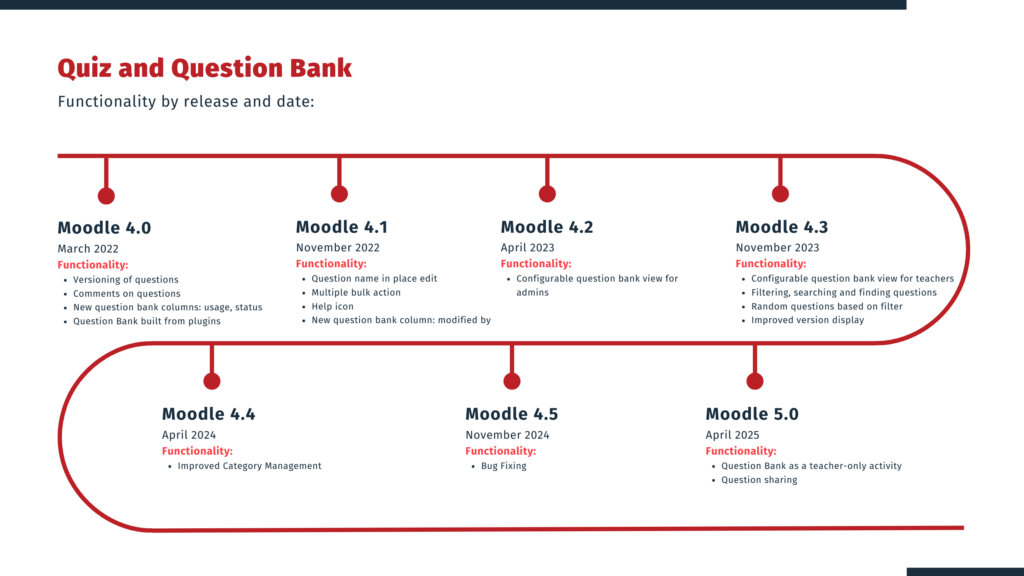A Story of Collaborative Vision, Patience and Community-driven Improvement
As the world’s leading open source Learning Management System (LMS), Moodle is built on a rich international community of educators, united by a passion for enabling and measuring student progress and contributing to educational best practice worldwide. This collaboration has delivered the most significant upgrade to Moodle’s Question Bank in its history, benefiting educators and learners globally.
Such a community thrives on an ethical foundation of collaboration and sharing. Hence why open source is the only real and fair option for software creation in the sector, bringing to life Eric S. Raymond’s ‘bazaar’ style of technical development: “decentralized, open…by a large, loosely coordinated group of volunteers.1”
This article aims to discover how such a ‘coordinated group of volunteers’ achieved success in transforming the way Moodle supports lecturers in the digital assessment and grading of their students, through the Quiz and Question Bank initiative.
It also outlines the features and benefits of engaging in open source development as an educational professional, with the intention of attracting more ‘volunteer’ contributors from around the world to the Moodle endeavour.
Our hosts on this journey are the co-leaders of the Quiz and Question Bank Collective: Antonia Bonaccorso from ETH Zürich, Thomas Korner from the Canton of Zürich, Luca Bösch from Bern University of Applied Science and Tim Hunt from the Open University in the UK.
How the Collective formed
In 2018, Thomas and Luca had been jointly involved in integrating Safe Exam Browser into Moodle. Luca says: “It was a hard piece of work, and as soon as it was finished, Thomas came along with the idea of taking a really big step for Moodle 4 and improving the quiz engine.
“I knew Tim from an Erasmus visit to Milton Keynes, and since he is one of the most experienced users of the Moodle universe and the maintainer of the Quiz as well as of the Question components, I knew we had to include him.”
“I was a bit nervous about approaching Tim, but it was one of the brightest moments for me when Tim said, ‘Yeah, let’s have a look! ” comments Thomas.
“So the three of us were born as the core team of this project in about 2020. It was time to finally get serious about a known problem that had rumbled in the background for a while.”

The Problem
Outlining the background to the Quiz and Question Bank problem, Tim says: “This goes back a long time, possibly about 17 years since the first user enquiry about it. Someone had tried to solve the problem of sharing questions, but hindsight showed that it hadn’t really met people’s needs.
“When Luca and Thomas came to me I knew this was a long-standing difficult problem that no one had been brave enough to tackle but which needed to be dealt with!”
The complexities came to light at the 2017 Leipzig Moodle Moot, during the E-Assessment Special Interest Group workshop.
Recalling the experience, Luca says: “I can still remember the big chalkboard where we listed all the actual functionality gaps, bugs and required modifications in how Moodle was assembling and dealing with questions, quizzes and grading.
“The biggest pain point was how siloed the questions were. There was no real possibility of using a sixth-grade math question in the seventh-grade course. Lecturers were having to copy and duplicate it, which was really inefficient.”
The task still seemed overwhelming, and other work took precedence including the Safe Exam Browser integration. But the demand for digital assessments was already becoming more pressing even before the start of 2020. It was time to get serious about making the changes required.
“Moodle 3.9 was released in June 2020,” highlights Tim, “then Martin Dougiamas announced a delay of around 18 months ahead of Moodle 4. This gave us the window of opportunity to do something big.”
The Complexities
Describing the complexities in adapting the assessment engine, Tim says: “The ramifications of the solution were complicated, involving version control, search functionality, visibility of statistical information and ease of customisation.”
“Although we are all members of the Moodle User Community, which can fund bug fixes and modifications, the scale of the development we wanted to engage in was, by necessity, independent from that. It was rather a lot like founding a startup,” reflects Thomas.
“It was a lot to prioritise and a lot to navigate, including community requirements, development resources, funding and, not least, Moodle HQ!”
Nevertheless, the team began approaching potential backers and recruited technical capability for the development through Moodle partners Catalyst IT.
“A Moodle partner with a track record of successful contributions to Moodle core can help to ensure HQ understands what’s happening, and so smooth the path to our changes getting integrated,” says Tim.
Engaging Moodle Users
Having support from the Moodle Community was crucial. Luca adds: “People can be resistant to change, so we made sure that we attended both local and global Moodle Moots, offering workshops and talks to Special Interest Groups, and constantly updating the community.
“It is gratifying that this activity paid off. People bought into what we were wanting to achieve, and we obtained donations from several contributing universities and institutions.
“The benefits of becoming a backer include contributors’ meetings several times a year, opportunities to influence and shape the direction and priorities of the development, being first to see the new functionality, and the satisfaction of investing in a public good.”
Project Approach
“We took an agile and collaborative approach to the development,” says Thomas.
“Our consultations with Moodle users revealed five headline items that people wanted, including sharing capability, keeping the history of all question edits, and making searching and finding questions better.
“Key to the changes we were wanting to make was to split out the functionality into different modules, to make customisations and plug-ins easier, and to eliminate the risks of adverse impacts and technical debt within the Moodle environment.”
Solution Outcomes
The following table highlights new functionality by release and date:

Success
The Quiz and Question Bank project has been recognised across the Moodle community as a landmark example of what can be achieved when collaboration, expertise, and shared vision align.
In December 2024, Brett Dalton, Head of Educational Solutions at Moodle, praised the initiative:
The Quiz and Question Bank in Moodle Project is a historic community-led project that has progressed thanks to the unwavering dedication of its coordinators Tim Hunt, Luca Bösch, Thomas Korner and Antonia Bonaccorso of ETH Zürich; the generosity of 23 institutions that have funded its development; and the technical prowess of engineers at both Catalyst AU and Catalyst UK since 2020.
Echoing this sentiment, Joey Murison, Managing Director at Catalyst IT Europe, added:
The Question Bank project is an outstanding example of what can be achieved when the Moodle community comes together. The dedication of Antonia, Luca, Thomas, Tim, and the many institutions involved has been nothing short of inspiring. At Catalyst, we’re proud to have contributed our expertise alongside theirs to deliver improvements that will benefit educators and learners worldwide for years to come. This is open source at its best – collaborative, innovative, and impactful.
“I guess we’re allowed to say that we made it and the Quiz and Question Bank Collective has been successful!” says Thomas. “Question sharing, tracking, commenting and evaluating over multiple courses are now core features in release 5.0.
“I feel very proud that what we have achieved can be enjoyed as much by universities in Switzerland as by primary schools in Suriname!
“Not only have we implemented rich new features, we have also made very good friendships, all invested in the ethos of continually improving our shared Moodle platform. This can only mean the Moodleverse will go from strength to strength.”
Impact and Benefits of Open Source Development
Reflecting on the impact of the Quiz and Question Bank initiative Tim says: “This is an important model for continuous improvement in the Moodle teaching and learning platform, offering universities, colleges and schools all over the world affordable access to the technology and professional support that enables best practice.
“Rather than spend a lot of money on proprietary software, or on unreliable commercial solutions, open source platforms occupy the financial middle ground for institutions to benefit from robust and extensive LMS technology.”
Educational specialists can also be reassured about the security and copyright of their intellectual property. Tim explains: “The GPL is the open source license that protects code from being taken and exploited by anyone who is not willing to keep the code open. So open source is a safe environment to collaborate for the common good.”
Next Steps
Antonia, Thomas, Luca and Tim are having a short well-deserved rest, and observing how the Quiz and Question Bank will bed in amongst the user community. But besides some bug fixing which is normal in such huge code changes they are already discussing the next big thing they could work on!
The team recognises it plays an important role in consulting on, orchestrating and project-managing large-scale and complex improvements that benefit many Moodle participants.
As such they would be delighted to hear from any Moodle users and potential investors who have identified substantial requirements for improvement on the LMS, but who are not sure how to make the changes happen.
If you have a vision for improving Moodle and want to see it realised, now is the time to get involved. Contact Luca Bösch to start the conversation.
With Catalyst, you have the Freedom to Innovate.
- Eric S. Raymond The Cathedral and The Bazaar (1997, revised 2001) ↩︎

